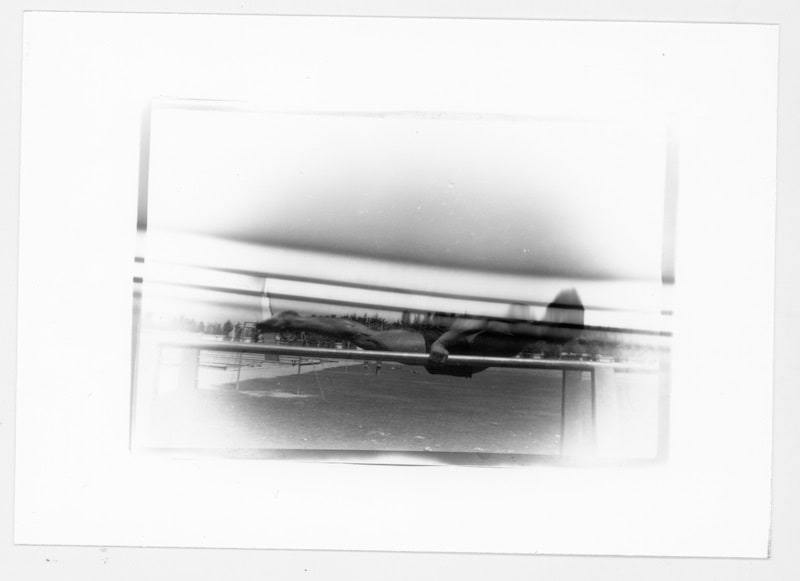Errata: Keren Benbenisty, Nyeema Morgan, Samira Yamin, and Miao Wang.

PATRON is proud to announce Errata, a group exhibition highlighting works by four artists, Keren Benbenisty, Nyeema Morgan, Samira Yamin, and Miao Wang. Borrowing an editorial term for collected corrections or clarifications for a previously published document, the exhibition considers how we build our identity from fragments of memory, images, and knowledge. Memory is always incomplete–our brains fill in gaps with fictional specifics, mis-remembering, torquing, partially erasing. Any attempt to revisit the past will be colored through the lenses of one’s current experience. Through experimental and material-based approaches to painting, photography, and drawing, the artists in the exhibition reinforce the power of recurrent images as constant, rich shapers of personal and social identity.
Nyeema Morgan’s Forty-Seven Easy Poundcakes Like grandma Use To Make (2007-2012) is a series of forty-seven digital drawings. Morgan searched the web for “easy poundcake recipes'' in the years after her own maternal grandmother’s passing. Finding 46 distinct, published recipes, Morgan assembled the typed instructions for each, starting with her grandmother’s–adding arrows and strike-throughs to indicate where each recipe diverged from the one previously listed. As a group, the works fracture apart from the definitive recipe. Intention, audience, and style are left to the wayside, the text divulges from their original use, and take on new potency.
Likewise taking familial ephemera as a point of departure are Samira Yamin’s Entrainment Exercises (2023), unique prints developed from a series of negatives the artist received of her paternal grandfather, who was training as a professional gymnast in Iran during the 1950s. Employing a self-developed, analog process by which water ripples over the images as they are being developed.Yamin’s shifts the subject of the images from the individuals pictured to her own psychological processing of these images.Yamin’s re-engagement with the images animates an otherwise untapped connection to her family’s past through this act of image making, that suggests a sense of play, which belies the separation forced by time, space, and migration.
Keren Benbenisty’s collages mimic the horticultural technique whereby cuttings taken from different plants are joined to create a hybrid species. Drawing on a personal slide archive of color photographs taken by her father, shortly after immigrating from Turkey to Israel in the 1960s, Tristeza (2021 - 2023) is the result of the artist’s single-minded attempt to cultivate a blue orange (oranges are historically a symbol of Israel nationhood). An industry historically heavily dependent on manual labor, including the artist’s own Moroccan-born grandmother, the fruit holds the intersection of personal and political. Titled after the plague that struck orange trees during 2020, and the word for “sadness” in Latin-based languages, Benbenisty’s futile attempt at growing a surreal blue fruit unpeels a confluence of past-present-future, the contradictions and failures of which are only made visible through their own erasure.
Wang’s jewel-like watercolor paintings extend the power of water, with a direct confrontation between the artist’s life in Chicago (where she has been based since 2011) and her native China. Developed from hundreds of layers of watercolor wash, Wang’s diptych, ________ (2023), offers a bodily score of her immediate surroundings in reaction to the deeply symbolic, and political, color red. Layered on a synthetic, waterproof paper, the liquid layers form an almost skin-like membrane, bearing the physical traces of its environment. In II (2023), Wang allows the wash of her black watercolor pigment to pool and fall, forming a pair of kindred spirits. Like Yamin, Wang embraces the soft power of water. Like waves on a shore, whose constant repetition shapes and erodes, constructing the shoreline, images–commercial, political, personal, mythological–wash over our beings, shaping formation of identity through repetition.
Morgan, Yamin, Benbenisty, and Wang consider the impulse to revise, to correct, to revisit. Their attempts at correction serve only to underscore the ambiguity of symbols, the delusions, and failures of myth, and the impossibility of revising history. Yet by re-engaging with the past, the artists in the exhibition return to elements of errata, and, through their own material processes, recombine them into active containers of presence.



